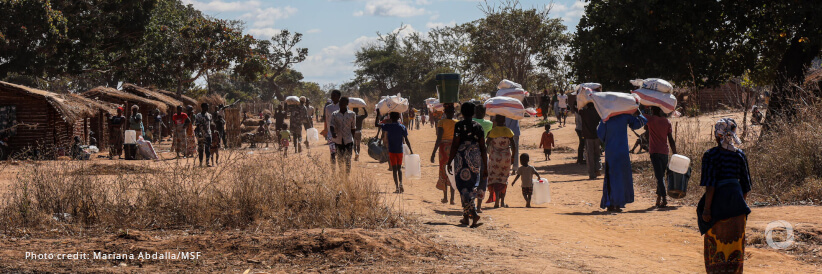Over 25,000 people have been newly displaced in Mozambique in a matter of weeks. They join close to 1.3 million people who have been uprooted by the armed conflict, back-to-back cyclones, and drought.
With critical funding running out, UNHCR, the UN Refugee Agency, like other humanitarian actors, is raising the alarm. Its ability to protect and assist those in urgent need is being pushed to the limit.
Cabo Delgado Province, home to significant gas reserves and other valuable natural resources like gems and minerals, is not only the base of multinational companies but also the epicentre of an ongoing conflict where internal displacement is growing. Attacks by non-state armed groups on civilians and infrastructure continue, forcing people to flee and disrupting efforts toward solutions and development. Thousands have lost their homes, many for the second or third time, and are seeking safety in already overstretched communities.
The renewed intensity of the conflict is affecting areas that were previously considered relatively stable, with hostilities spilling over into new provinces. Ancuabe and Montepuez are among the most heavily affected, with 14,929 and 5,370 newly displaced people, respectively, as of April. In Niassa Province, where displacement had previously been limited, more than 2,000 individuals have been forced to flee since 19 March.
These developments come at a moment of extreme strain on the humanitarian response in Mozambique. Across the board, organizations face shrinking budgets while needs continue to rise. The result is a dangerous equation: less funding and more people in need.
Mozambique is simultaneously grappling with a triple crisis: armed conflict and displacement, recurring extreme weather events, and months of post-electoral unrest. In March, Cyclone Jude made landfall in Nampula Province, marking the third major cyclone to hit the country in just three months. These storms devastated areas where families displaced by the armed conflict had sought refuge, compounding already dire humanitarian needs.
Previously, civil unrest in late 2024 led some Mozambicans to seek refuge in neighbouring Malawi. Most have since returned voluntarily, but the experience remains a stark reminder of how fragile the situation has become. There are, in total, 5.2 million people in need of humanitarian assistance in the country.
In this challenging environment, UNHCR’s ability to respond is severely constrained by a critical lack of funding. Protection needs, including support for survivors of gender-based violence, mental health services, and access to civil documentation, far exceed available resources.
UNHCR is also concerned about the impact of funding cuts on the refugee response. So far this year, we have only received 32 per cent of the required $42.7 million. In addition to the 710,000 people who are still internally displaced and the over 600,000 who returned to their districts of origin, Mozambique hosts approximately 25,000 refugees and asylum-seekers, primarily from the Democratic Republic of the Congo. In the Maratane Refugee Settlement in Nampula Province, UNHCR may be forced to suspend its support for essential services such as health care and education due to the funding shortfall.
The Government and people of Mozambique have consistently shown commitment to hosting and supporting refugees and internally displaced people, despite being one of the poorest countries in the world. Communities across the country have also demonstrated deep solidarity. But it is neither fair nor realistic to expect Mozambique to bear this burden alone.
The triple crisis is fueling a silent economic crisis. Food prices, already very high, have spiked in recent months, often by 10 to 20 per cent, while the incomes of the population continue to decline. The high level of public debt restricts the government’s capacity to intervene.

